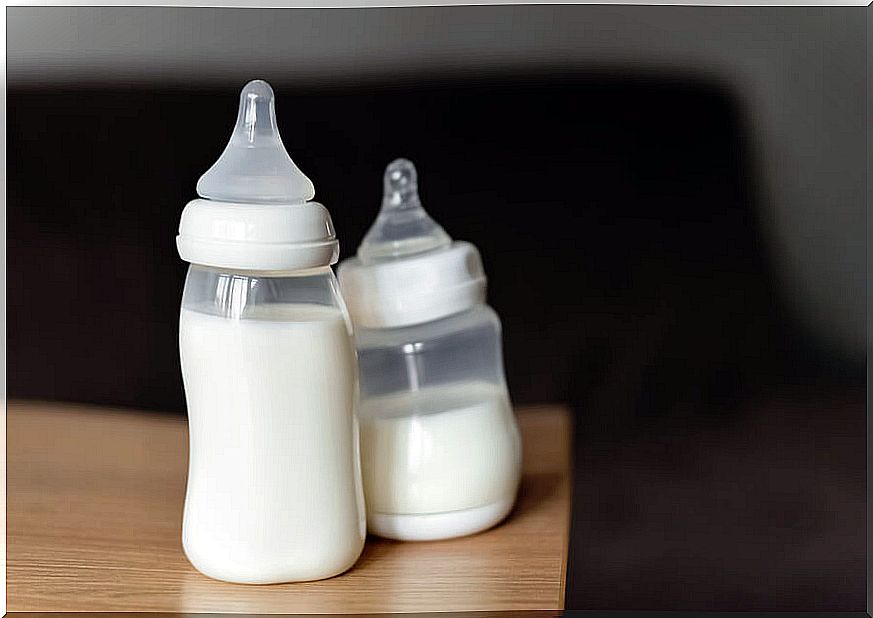Infant Milk And Formulas

Breastfeeding is the optimal form of feeding for the newborn. But when breastfeeding is not done, the usual choice is infant formula and milk. In this article we will explain the different infant formulas and milk that exist depending on the needs of your baby.
What milk and infant formulas are there?
Infant milk and formulas are foods for infants that are suitable to fully or partially replace human milk, meeting the normal nutritional needs of the infant.
All are usually presented in powder form to dissolve in water (normally at 13%, and it is convenient that this is previously boiled) or already prepared for direct use in liquid form.
Therefore, it is convenient that the rules of use of these products are individualized for each child, both to meet their needs and not to overfeed them and achieve optimal growth and development.
The Nutrition committees of the AAP (American Academy of Pediatrics ) , ESPGHAN (The European Society for Pediatric Gastroenterology Hepatology and Nutrition) and the Scientific Committee on Food of the European Commission have established recommendations on the qualitative and quantitative characteristics that should gather the milk formulas.

There are several types of formulas: the starting formulas, the continuation formulas and the special formulas that within them there are several.
Startup formulas
They are manufactured in order to meet the needs of the infant on their own. They are used from birth to 4 or 6 months of age. They are obtained from cow’s milk, although it is intended to imitate the composition of breast milk.
Continuation formulas
These formulas are designed for use from 4-6 months of age and always forming part of the complementary diet. They can be used up to 3 years. Regarding the composition, strict limits of the energy content are not defined, since the child already receives food other than milk.
Milks and special formulas
They are formulas specially made for infants and young children who have problems or limitations in the processes of absorption, digestion or inability to metabolize certain substances. For its preparation, it is usually based on normal formulas from which modifications are made.
Lactose-free milks
In these preparations, lactose has been totally or partially replaced by dextrinomaltose or glucose polymers. It is indicated for infants with congenital or acquired lactase deficiencies or with galactosemia (error in carbohydrate metabolism).
In this sense, due to the beneficial effect of lactose on the absorption of calcium and magnesium, it is convenient that its consumption be maintained temporarily until the enzymatic activity recovers.
Soy formulas
In these formulas, purified soybeans are used as a protein source, which is heat treated to reduce the activity of trypsin and hemagglutinin inhibitors. It is usually taken by children with:
- Lactose or galactose free diet.
- Infants of vegan parents.
- Allergy to cow’s milk proteins.
- Diarrhea
- Eczema
Milks for premature babies
If your baby was born prematurely, he should take a special milk, since these milks have a higher content of proteins, carbohydrates and lipids. Therefore, they have a higher caloric density with lower volumes than standard formulas.

Protein hydrolysates
Another type of transition milk and formulas are protein hydrolysates. They are preparations in which the proteins are predigested by thermal and later enzymatic hydrolysis. Depending on the degree of hydrolysis, they are divided into two groups: hypoallergenic and hypoantigenic formulas. They are indicated for babies with:
- Fat malabsorption.
- Cow’s milk protein allergy.
- Prolonged diarrhea
- Vomiting
- Colic.
Elemental formulas
There are also elementary formulas. In these preparations, proteins are provided in the form of synthetic amino acids, which determines their high osmolarity, high renal solute load, and bad taste, but the antigenic potential is zero. Its indications are very restricted:
- Severe allergy to cow’s milk protein.
- Failure to treat hydrolyzed formulas.
- Severe malnutrition
- After prolonged parenteral nutrition.
Milks and formulas for minor problems
Anti-regurgitation formulas
They are formulas whose composition is intended for the treatment of the child with regurgitation. A thickener has been added, which can be carob seed flour or corn or rice starch.
Anti-constipation or anti-colic formulas
Their triglycerides are modified to obtain palmitic acid in the beta position, a composition similar to that of breast milk. In some cases they contain a greater amount of magnesium with a laxative effect.










